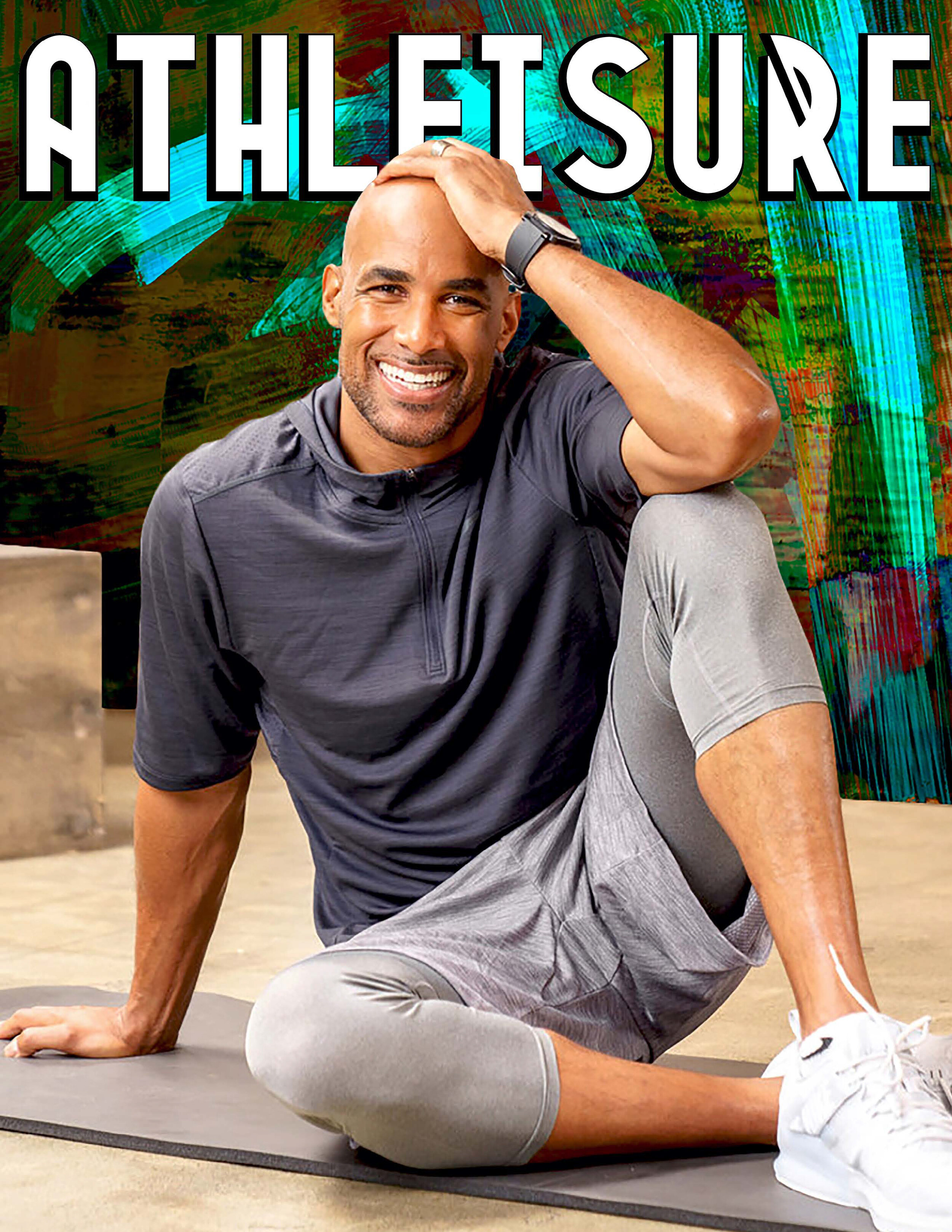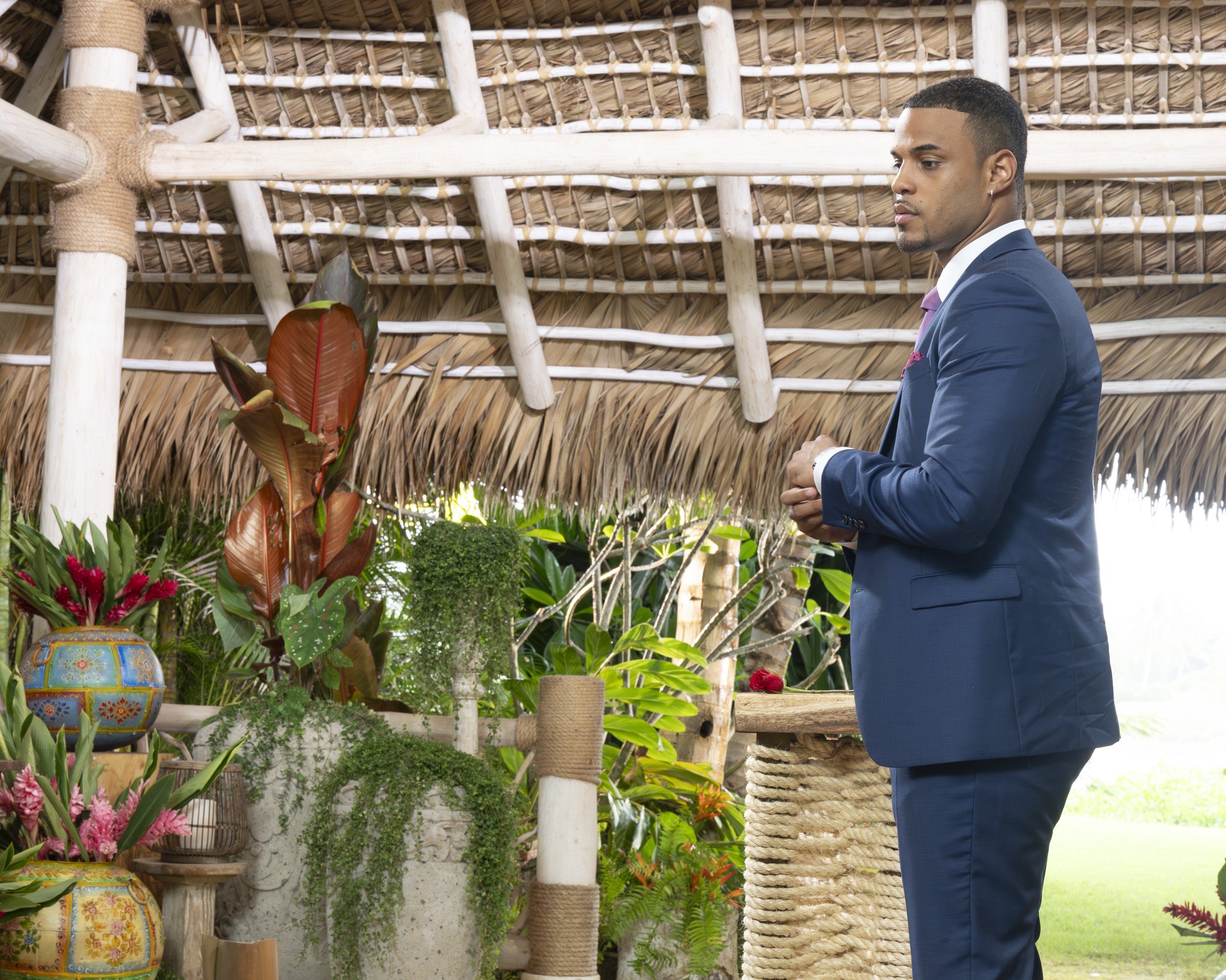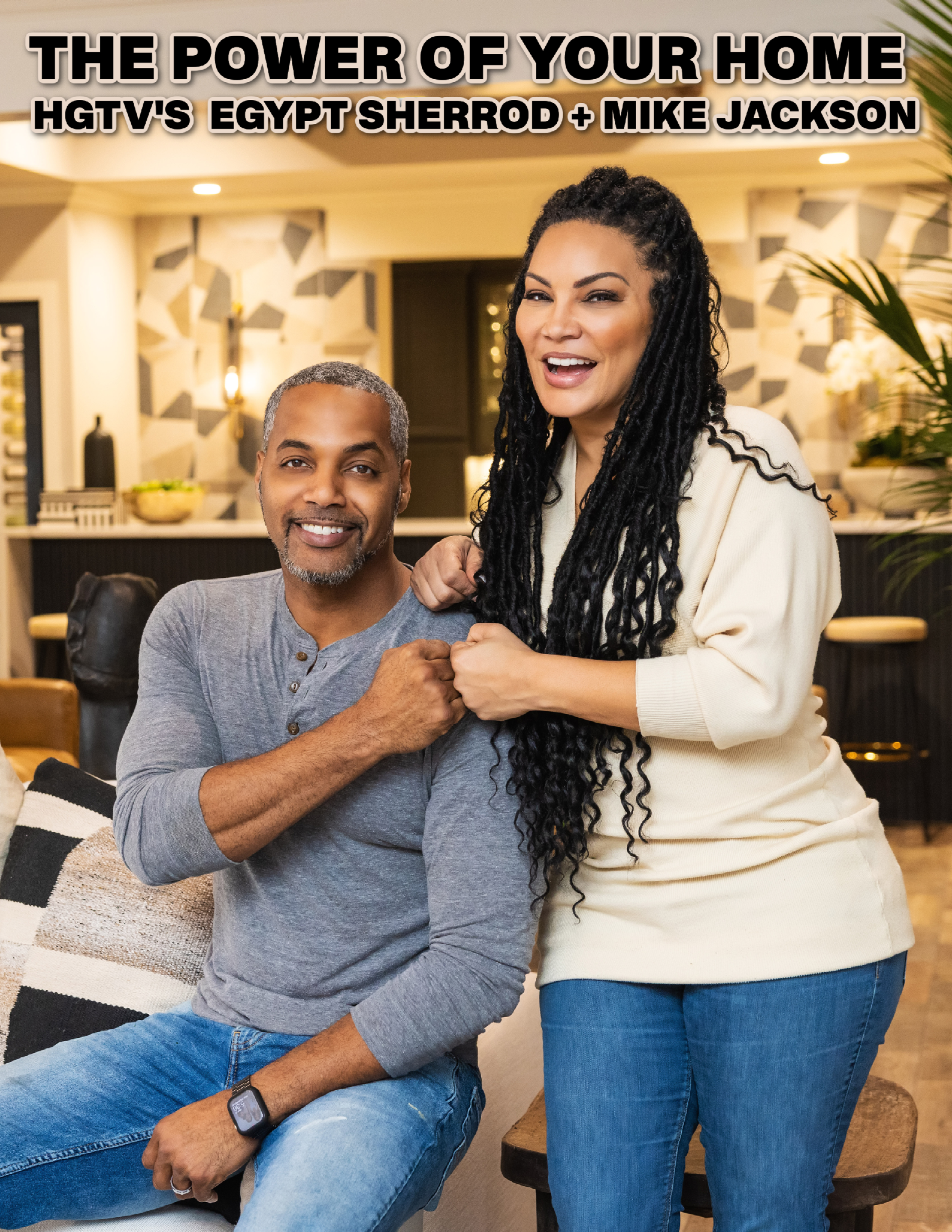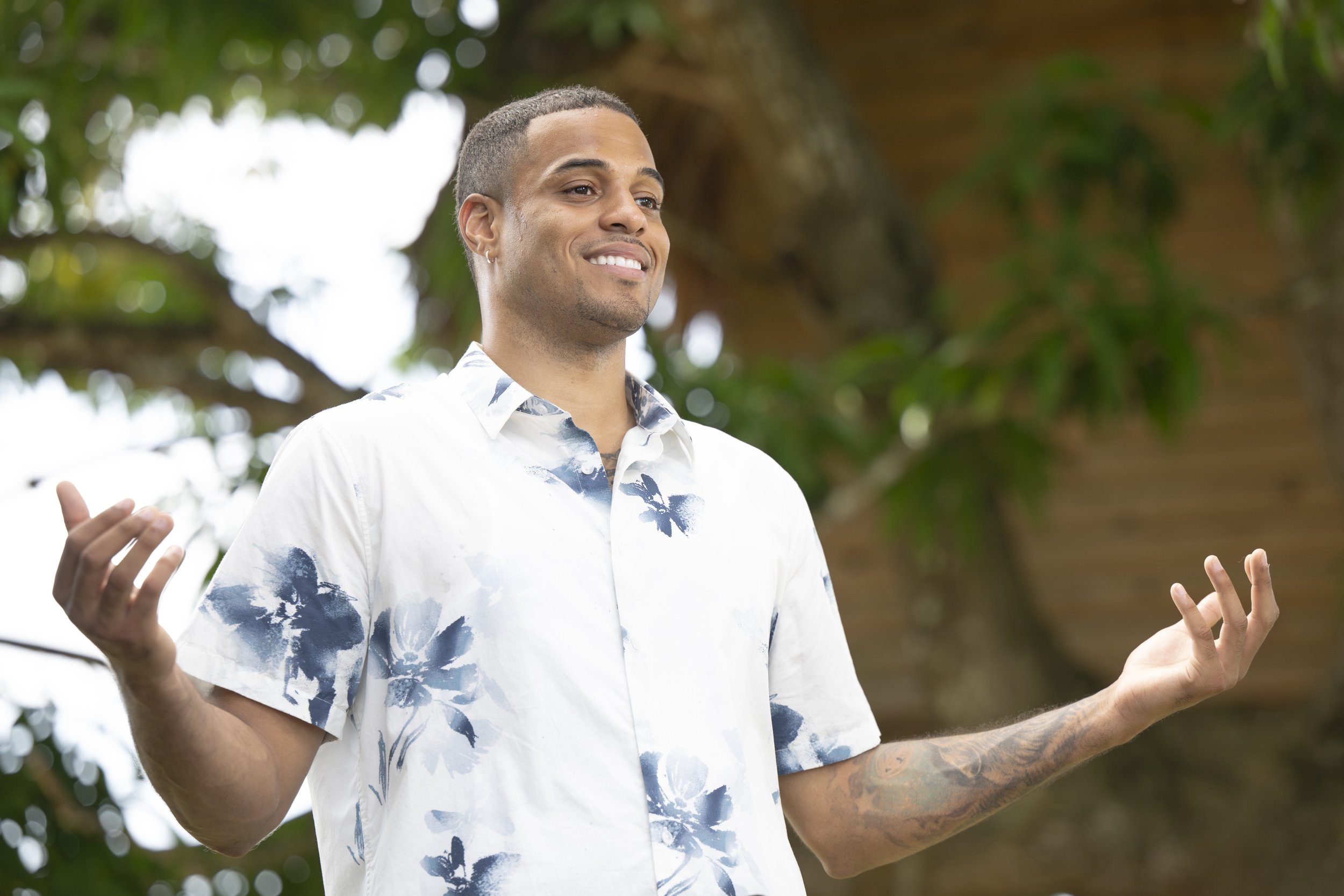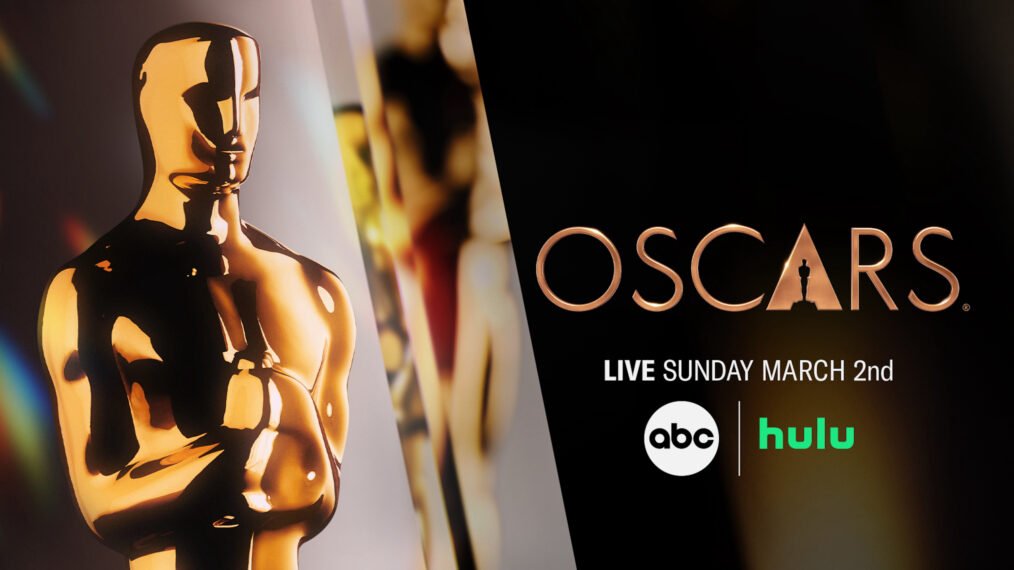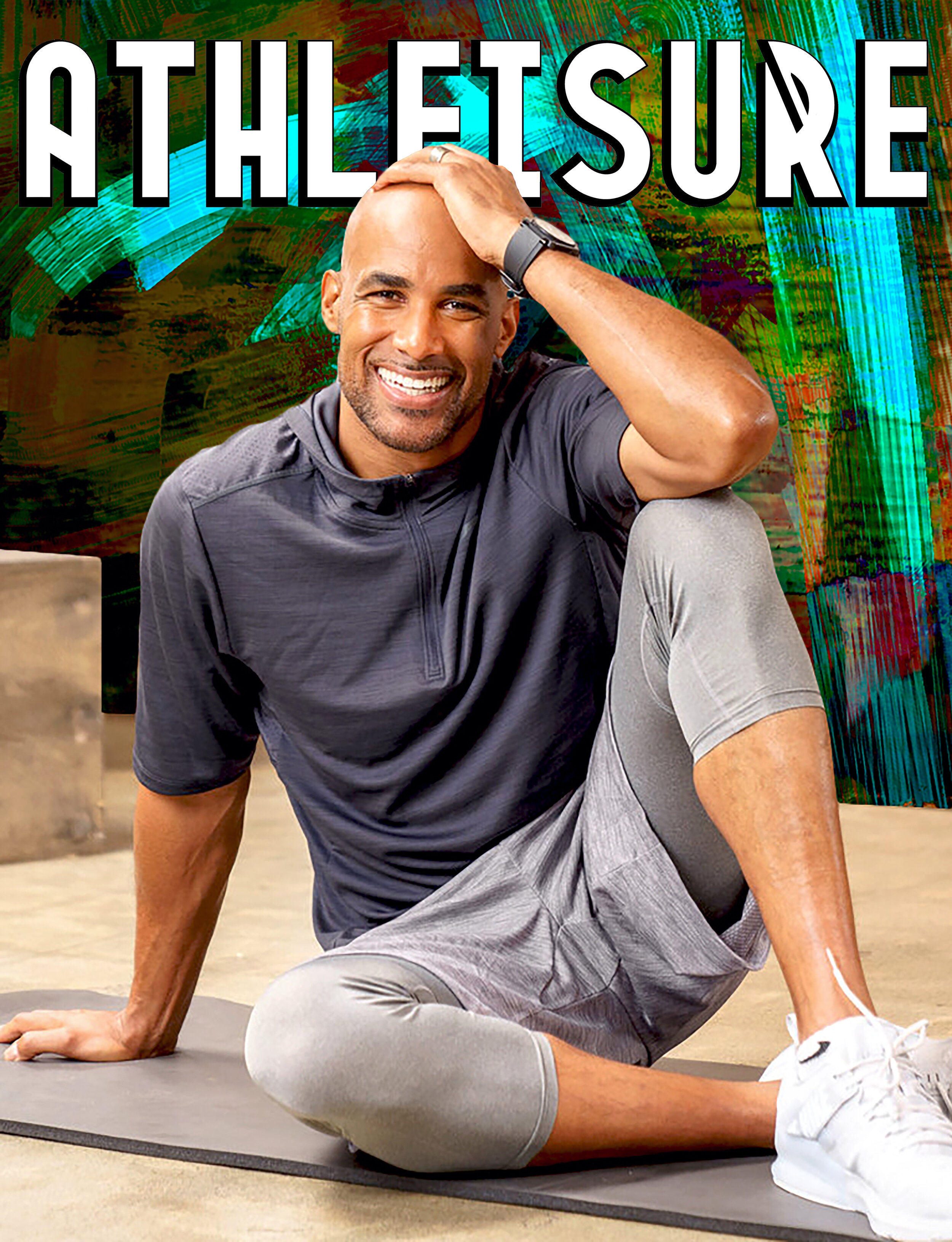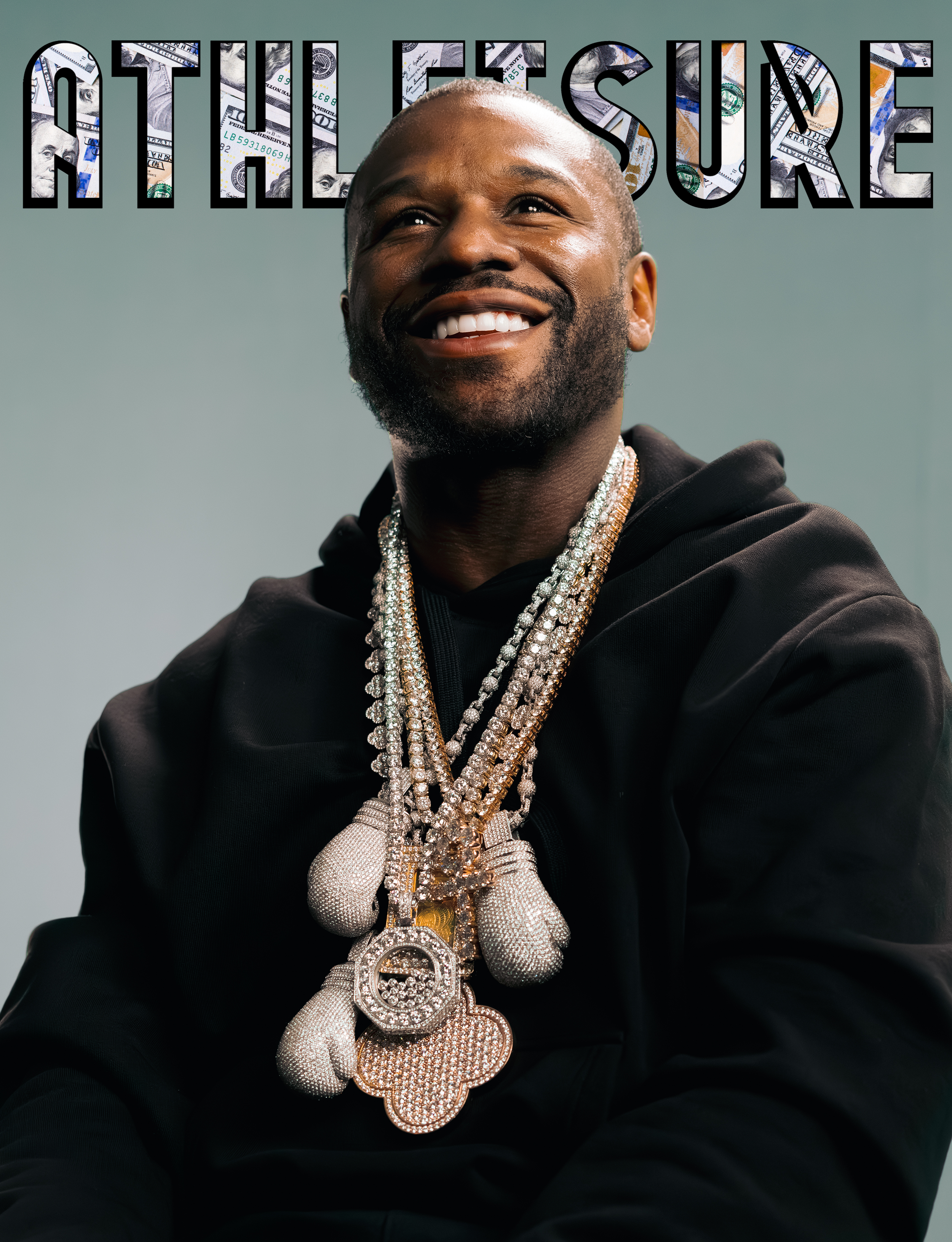As we begin to transition from summer to the fall, we've all been navigating this crazy year that continues to challenge us as we go about our days. For many, it has encouraged us to go beyond ourselves to live our best lives, bond with our families and to put a lot of good back into our world.
This month's cover is Boris Kodjoe, who we have enjoyed in Showtime's TV series Soul Food, CBS' Code Black, NETFLIX's House of Cards and on ABC's Station 19. We talked about how he came to acting, preparing to shoot the 4th season of this show. We also talk about how he has utilized his platform in order to provide masks for First Responders through his #HopeForHeroes initiative, focusing on social justice as well as inspiring everyone to get their physical and mental health aligned in order to be their most optimized selves.
ATHLEISURE MAG: We’ve been a fan of yours since Showtime’s Soul Food and seeing the interaction with the Josephs family and how they remind us of a number of our own family members and then other shows that are our favorites from CBS’ Code Black, Netflix’s House of Cards and now ABC’s Station 19, what was the moment that you realized that you wanted to be an actor?
BORIS KODJOE: You know, it was a process because I started going to acting class in my mid 20’s because I wanted to learn to be able to speak better English. Growing up in Germany and coming over here for college, I still wasn’t a very good English speaker. I could communicate but I had a very strong German accent. So in order to be able to speak better, a friend of mine suggested that I should go to acting class to show me how to enunciate and breathing techniques and stuff. That’s when I started going to class. Throughout auditing some classes and going through that and then being able to put up some scenes and stuff. I fell in love with it. It wasn’t a very traditional way to get into the business, but that’s my story.
AM: That’s a great story! At what point did you feel that you had made it as an actor? Was it a specific role, a show, an accolade or just the body of work that you had created?
BK: You know, I’m not sure what that is in terms of making it as an actor, right? I think that we have different objectives at different points in our careers and our lives really. It’s a journey and once you understand that, you can let go of some of the pressure that you put on yourself. Instead of focusing on the destination, you focus on enjoying the journey and I guess the moment that I realized that this was my way of making a living, was halfway through Soul Food. It’s when I realized, “ok, I am starting my career and this is what I am going to be doing." It’s a great feeling when you have an idea on which direction your journey is going to go. Even if it is just for a short moment in time. I’ve been lucky that I have been on this journey for 20 years now.
AM: Do you have a specific process when you’re deciding whether you’re going to take a role or a specific show? You take on so many characters that have such a depth to them. How do you decide what makes sense for you?
BK: You want to be able to relate to what the character is going through, We’re in a business where we get to work with so many talented people. I’ve learned so much with different actors, directors and producers so it’s a combination of the scripts, the production, who’s involved and also where I am in my life. I have 2 kids, I’m married, we live in Los Angeles and sometimes, I don’t want to spend 5 months in Bulgaria to shoot a movie in the winter, right? Because the kids need me around and I need to be around. In a case like that, I would say, “ok I am going to do a show here.” So it all depends on what the situation is at the time and what the script looks like.
AM: We enjoy seeing you as Captain Robert Sullivan on Station 19. What is it about the character that made you want to play him and what was it about the show that made you want to join that cast?
BK: It started with Shonda Rhimes. I have been a fan of hers for a very long time and I have always wanted to work with her and this was a great opportunity for me to be a part of Shondaland. Her and Krista Vernoff are changing the way that we watch TV. So that was the first reason and then the cast is family. They’re just beautiful, beautiful people that I have grown to love and just become close with. And then it’s fun to play a fire fighter. That’s something that I had wanted to do as a child. You know – that or being a cowboy or a train conductor haha. It was a childhood dream come true to be able to ride in these big trucks, put on the gear and be able to run around to be able to represent these real live heroes on the front lines. They’re risking their lives every single day for us – it’s an honor.
AM: This past season, we got to know a lot more about Robert as a person. We specifically remember when we watched the episode about ICE coming to raid the restaurant and looking at how impactful that scene was and your character was telling Pruitt Herrera (Miguel Sandoval) about why he felt compelled to intervene. Were there elements of your family history that were utilized in that scene and was that hard to play?
BK: Yes and no. Obviously, it’s a creative process so there were some fundamental building blocks that were taken from my real life. My maternal grandfather fought in the war in Germany and so he had a whole lot of stories that he told me when I was a really young kid that I remember. They obviously took creative license in order to make it applicable to the story and to create an analogy to what’s going on today. Which I thought that they did a great job with.
AM: Are there any nuggets that you can tell us about the upcoming season and when are you guys going back into production?
BK: We actually go into production this week!
AM: What!
BK: Yeah, they put a lot of safety measures in place in order to keep us safe and to keep everyone – the whole crew safe that is involved in the production. ABC and Disney, they have done a really good job in making sure that we are all safe and that we can do our jobs.
I have to speculate myself because I’m not sure what’s going to happen. All I can tell you is that clearly my character has been through a lot – getting married to Andi (Jaina Lee Ortiz), having the surgery to alleviate some of the chronic pain that he has been suffering through for years, the substance abuse that got him in trouble – so there are a lot of things that are at stake right now for Robert. In this new season, clearly we’re going to address all of that on top of this new world that we’re all living in – this COVID world. There’s also social justice and equality with the struggle that we’re in. Krista Vernoff, Shonda and everyone at Shondaland take pride in creating dialogue by way of storylines that are introduced that challenge people to confront some of the issues that we are dealing with. So I am certain that we will deal with some of them – the real life issues whether it’s the pandemic or the racial justice issues that we’re dealing with still and again. I’m sure that we will see some of these pop up in our scripts.
AM: We’re sure about that too. One of the things that we love about this show is the fact that there are these great crossover episodes with Grey’s Anatomy. How is it for you to be able to engage with that whole cast as well as to go into that portion of their audience as well? That must be such a fun thing that you are able to do a bit of a dual play there.
BK: You know, the Grey’s Anatomy family is a part of our family. We’re part of their family, they’re also tremendous human beings over there and they are super talented and super nice. Anytime we get to play with the other team, it’s always a lot of fun. Again, it’s an extended family so everybody is real close, we love each other and it’s a really great situation for us to be in.
AM: With COVID-19, it’s changing a lot of things that we would normally do. We’ve been preaching to our readers the importance of washing their hands, wearing face masks and social distancing. We first learned about GymWrap last year via our cover, WWE + E! Total Divas' Trinity Fatu/ Naomi who has been an ambassador for the brand. You have this amazing initiative with #HopeForHeroes. Can you tell us more about that and how GymWrap is involved as I know your wife, Nicole Ari Parker is the founder. How did it come together and what are you doing?
BK: Watching the news everyday in the beginning of March and realizing the devastating impact that this pandemic has had on this entire country and the entire world. Seeing how many people are struggling to put food on the table, losing their jobs and the essential workers and the first responders and all these people are putting their lives at risk and risking their safety every single day to keep us safe. They’re struggling without PPE and without appropriate gear to keep them safe, Nicole one day said, “hey, why don’t we manufacture masks? We have a great operation with great people that have been supporting us and have been working with us.” So we called the team together and said, “how quickly can we manufacture these masks?” Credit to our team, they did an amazing job to turn this around really fast and we were able to create the #HelpOurHeroes initiative. With this initiative, we have now shipped over half a million dollars worth of free masks for our heroes on the frontlines, essential w orkers and first responders. I’m so thankful for the support that we have gotten from our fans and from everybody that’s out there who has gotten together to support these initiatives and those who have bought these masks from us.
It’s the least that we can do. We’re in a fortunate position where we can support others or can lend a hand, I think that it is our responsibility to lead collectively and individually. We jumped right in. Again it was Nicole’s idea and the GymWrap team got together really quickly and hopefully we will be able to keep on doing this for a long time.
AM: It’s important while this is going on for everyone to come together and coalesce around this. While we have this pandemic going on, we also have the focus of social justice and the #BlackLivesMatter movement taking place as well. We enjoyed seeing on your Instagram that you have actually utilized your platform to have these videos to talk about deconstructing buzzwords and hot button issues. Why was that so important for you so that people can be aware and understand all of the different things that are surrounding this issue?
BK: Being Black and living in this country, I think it requires you to have a sense of awareness and it requires you to use whatever tools you have – voice or platform to support the movement. In order to support our struggle for equity, our struggle for equality, our struggle for social justice or equal housing, education, healthcare. Those should all be basic human rights granted to every single person who lives here and it hasn’t been that way in 400 years.
To me, it’s an inherent responsibility that POC, Black people carry that has to be expressed and voiced. That’s how we raise our children, we have these dialogues with these children every single day to equip them with knowledge to teach them about history – to make them understand how important it is for them to speak up and to be a part of the solution. I think we’re in a pivotal moment in history where the #BlackLivesMatter movement has touched every corner of the planet. We see more people than ever get on the streets and protest and voice their outrage about what has happened and not just with George Floyd, Breonna Taylor and countless others. The systemic racism that has been prevalent here for hundreds of years and has been put in place systematically and really mechanically to create this huge gigantic, generational wealth gap and inequality. I always try to see the silver lining and I think that the pandemic has helped us focus on these social justice and equality issues because in the past 6 months, when everything came to a standstill we were finally able to focus on this movement and not be distracted by other things.
That’s how I look at it. I think it’s important that we continue to mobilize and galvanize everybody out there to co-ordinate and make sure that we don’t just stand here and watch. I think it’s important that we formulate a real plan for action and that we appeal to our allies. Whether it’s corporations, organizations, communities and individuals, to state very clearly that it’s not enough not to be racist anymore. You have to be anti-racist. Because racism is not just the overt violence and the hatred that we see on TV. Racism is also ignorance. Racism is apathy. Racism is privilege. That’s all part of the system that has been put in place to systematically and continuously oppress Black people. It’s time for white people to join in and speak up and not look away because they’re not affected or they think that they’re not affected. People need to realize that with equality, with economic equity comes a stronger economy. So, this shouldn’t be a divisive issue movement. This movement should band us together in order to create a better country, a stronger country, an economically stronger country and a more equitable and equal country.
AM: We have the election coming up, do you plan on using that as well to make sure that people are registered to vote, the methods by which that they can do so and additional points that you will be speaking to?
BK: Absolutely! That’s where it starts. We have to mobilize and go out and vote. We have to fight for our right to be able to access polling stations and not fall into the trap of being discouraged to get out and vote. Every single vote counts. My wife and I have definitely supported the voting efforts. It’s so important and this election is the most important election that we have ever had. It’s crucial that we get this guy out of the White House as soon as possible.
AM: With all of these things that are going on as a parent, how difficult is it during these times to educate, protect and deal with all of these issues that have converged together at one time. We watch children who are involved from mask wearing, socialization, social justice etc. It must be a lot as a parent to have to navigate all of these things.
BK: It is a lot. The masks – the psychological effects of the pandemic, the social justice issues that are raging, not being able to see your friends, sitting in the house, being constricted, not having an outlet, not being able to go out and play basketball with your boys. Those are things that are going to affect children even as we’re going back to school now. There’s millions and millions of children now that don’t have the opportunity to engage online the way that they should because they don’t have the access to work wireless, they don’t have the devices, they don’t have parents present in the home because they have to work. It’s terrible – it’s really terrible and we are going to see children struggle for a long time because of these past 6 or 7 months. It’s sad. A so called super power, one of the top developed Western industrialized countries who are leading the world in technology and in science – arguably in the top 3 – isn’t able to appropriately support children in their schooling. It’s embarrassing. It’s embarrassing that the government hasn't done the necessary things to prevent almost 200K+ people from dying, to prevent over 5M people from being infected, to put testing in place for everybody as well as contact tracing. It’s absolutely embarrassing and disgusting. The effects are going to be felt for years and years to come and our children will have the burden and shoulder the weight of this year for the next 10 years. I’m really upset about it because it’s really so unnecessary.
AM: Wow it is.
One of the things that we looked up in preparing to talk with you today is the inaugural ESSENCE Full Circle Festival in Accra Ghana. We know a number of people that attended this event last year. What was the purpose of this event and why was it so important for you to be involved in it?
BK: It was important because first of all the president from Ghana, his excellency Nana Akufo-Addo he asked Bozoma Saint John and myself if we would host an event celebrating the Year of Return (Editors Note: The “Year of Return, Ghana 2019” was a major landmark spiritual and birth-right journey inviting the Global African family, home and abroad, to mark 400 years of the arrival of the first enslaved Africans in Jamestown, Virginia which affected the kith and kin that were forcefully taken from Africa. This event celebrated the cumulative resilience of all the victims of the Trans Atlantic Slave Trade who were scattered and displaced through the world in North America, South America, the Caribbean, Europe and Asia.) which was obviously in 2019. Of course we agreed, Bozoma was born in Ghana and my father is from Ghana. I have a very close relationship with the country and with my family there. We started working on Full Circle Festival as a celebration of our ancestry and our collective accomplishments looking back 400 years since the beginning of the slave trade. Traditionally, Western media has changed the picture of Africa that is disgraceful. That it’s a place and continent of war, corruption, poverty, hunger and starvation and this is just not true. We wanted to change that narrative and show people that Africa first of all is not a country, that Africa has the youngest population in the world of any other continent and that Africa also has 3 of the fastest growing economies in the world. Their technology and manufacturing is thriving in Africa. There’s amazing economic development opportunity on the continent. We come with a great culture and diversity with languages, food, music and beautiful locations. Not just for tourism, but like I said, for engaging in business.
The world’s reaction to what we did was tremendous. I had no idea that we would start this title wave and we ended up being able to contribute to adding $1.9B to the Ghanian economy in 1 year just by way of Year of Return. The increased interest and excitement of not just Ghana but Africa as a whole. It’s important for African Americans or any other members of the diaspora to understand that a lot of the issues or most of the issues that we’re dealing with here are directly related to the fact that we don’t know our history.
We don’t know where we came from. To reconnect with our ancestry and our heritage – our culture also means that we are reconnecting with our source. We’re reconnecting with our strength. We’re reconnecting with our power. We’re reconnecting with our beauty and our diversity. That redefines how we see ourselves and it redefines how we see our future and where we’re going with our future. It’s a tremendously important movement to create a bridge to our diaspora and the continent for more and more people to visit and to experience and to engage with the continent.
AM: I know that you have done 2 events there already, do you foresee doing other types of this nature obviously as things settle themselves down in terms of travel etc.
BK: Absolutely – we’re not going to stop. After Full Circle Festival started 2 years ago, other African countries started inquiring about having similar events and bringing more people. It’s a proud and humbling thing to be able to contribute to more and more people experiencing the continent.
AM: You’re known for being in really great shape and we enjoy finding out about workouts that you do that we should include in our own routines. Do you have workouts that you can share?
BK: I think that rather than focusing on specific exercises, it’s important to understand that you can be healthier, stronger and happier if you start including some healthy habits into your life. It doesn’t mean that you have to go into the gym for an hour and a half every day. All that means is that you commit to doing something each day to start adding some healthy habits to your day. That could be sitting for 5 minutes in total stillness and observing your breathing when you get up, meditate, doing easy and simple exercises for 5 or 10 minutes a day. Whether it’s squats or sit-ups or pushups – whatever you can do. You’ve got to start where you are. Oftentimes, we’re discouraged when we look at exercise videos and all of this advice that’s out there because we’re not there yet. Or it may not be the level that we’re able to obtain with the 6-packs and the gladiator physiques and it’s just not real for us because we have a job, responsibilities, bills to pay and kids to raise. We don’t have time to spend on ourselves for an hour and a half a day.
So with KoFit, we’re trying to show people that all it takes is 5 or 10 minutes a day to start moving and changing your life in a different direction. That’s what it’s all about. We do it as a family because it is more fun and it’s more sustainable.
AM: It’s fun to see that whole dynamic in there with KoFit. Why is health and wellness so important to you individually as well as to your family as a whole? AthleisureMag.
BK: Health and wellness is important because it goes hand in hand with your mental and your spiritual right? If you want to optimize your potential as a person, you can’t leave out your body. The body is where your emotions live and your physical dictates how you feel. If you are morbidly obese and struggling with conditions like heart disease and onset diabetes, you can’t fully enjoy your life and it’s just a fact. A lot of these issues we’re dealing with on a health level are avoidable. It’s important to claim your power by way of taking care of your body because your body is taking care of you. You have been blessed with your physical being, why not take care of it? The physical, the mental and the spiritual goes together. If one is lacking, you can never hope to maximize your potential.
AM: How do you take time for yourself as well as to focus on your coupleship with Nicole? It’s great to see you guys do projects and philanthropy together. How do you make sure that you guys are staying connected and that you take the time that you need to take care of yourself?
BK: You have to make it a priority and you have commit to each other and make sure that you are present, attentive and that you take care of each other and family comes first. There are struggles and you have to put in that effort and work. Sometimes there’s miscommunication and we go through our own things and go through patterns of things that we have had since we were kids that rear their ugly heads when we’re adults. We have to then confront those things and then talk, and talk some more and then some more. It’s a process – a journey. I think that you have to be able to give each other the space to make mistakes and not run for the hills. That’s the key.
AM: That’s true.
BK: Yeah, a lot of people when they see a little bit of a challenge, they run. So I think that’s one of the things that we really believe in that – I’m going to mess up, you’re going to mess up let’s give each other the space to grow, evolve and make mistakes. We all have flaws and great qualities like everyone else.
AM: Are there projects coming up that we should keep an eye out for that you’re working on?
BK: We’re going to really dive into KoFit the next couple of months because there’s no gyms open and even if, people are hesitant to go out and pay all of this money for gym memberships. We want to give people tools to stay healthy and happy at home. That’s not just working out, it’s mindfulness, breath work, meditation, yoga – things that as a culture we haven’t traditionally believed in but it is an important part of us being healthy and strong. We’re going to dive into that – my brother, his wife, Nicole and the kids to show people how easy it is to start creating some of these habits.
Then I’ll start working on Station 19 which will take me from all the way to May. We’re going to shoot from this week to May. It’s going to keep me busy for the next 9 months. I’m also working with the 2% Initiative that Robert Smith has introduced recently. It allows us to create pathways for big organizations and corporations of Fortune 100 companies to support Black communities across various sectors whether it’s banking, education, social justice, media, entertainment to start making some headway in reducing the generational wealth gap.
AM: What do you want your legacy to be?
BK: The most important part of my legacy is my kids. Those are 2 human beings that I raised and will be here long after I am gone. Hopefully, I have raised them in a way that has allowed them to find their purpose to be kind, empathetic, considerate and treat people with respect and love. Then I want to be known as some body who tried his best, learned from his mistakes and has hopefully touched a few people.
AM: We like talking to our changemakers as they inspire people and they are doing amazing things inside and outside of their verticals and communities. Who are 3 people that you have been inspired by that have assisted you where you are today?
BK: There are so many people – wow. I’ve always been inspired by great writers. Ta Nehisi Coates he’s a trailblazer, an activist that I really admire and respect. Right now, these are some of the people that I think are really important to the movement. Nikole Hannah Jones who started the 1619 Project with the New York Times. She’s somebody I admire and look up to. I admire some of the NBA players that are outspoken like LeBron and Chris Paul and people who are actively using their huge gigantic platform for change with police reform, social justice – I really admire these guys who are really outspoken right now.
IG @BorisKodjoe
PHOTOGRAPHY CREDITS | FRONT + BACK COVER, PG 16, 38, 42 + 44 Brandon Bobbins | FRONT + BACK COVER, PG 16, 38 + 42 Editorial Design by Athleisure Mag | PG 18 - 37 + 40 ABC Network Stills, Promo and BTS |
Hear activist, philanthropist and Station 19's, Boris Kodjoe on our show, #TRIBEGOALS - which is a part of Athleisure Studio, our multi-media podcast network! Make sure to subscribe to find out when the episode drops. You can hear it on Spotify, Apple Podcasts, Google Podcasts and wherever you enjoy listening to your favorite podcast.
Read the Aug Issue of Athleisure Mag #56 and see Living with Purpose with Boris Kodjoe in mag.















